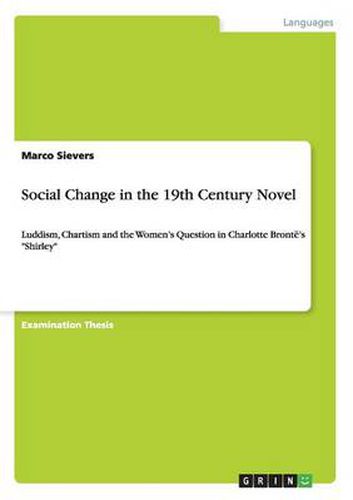Readings Newsletter
Become a Readings Member to make your shopping experience even easier.
Sign in or sign up for free!
You’re not far away from qualifying for FREE standard shipping within Australia
You’ve qualified for FREE standard shipping within Australia
The cart is loading…






Examination Thesis from the year 2008 in the subject English - Literature, Works, grade: 1,0, University of Hannover (Philosophische Fakultat / Englisches Seminar), language: English, abstract: The approach of this dissertation is based on New Historicism and Cultural Materialism, and examines the processes of social change in the novel. It contextualises the industrial plot of Shirley on two time levels, on the level of the setting (1811-12) and on the level of the novel’s production and publication (1848-49).The study first elaborates on Shirley as a condition of England novel before shedding light on the historical conditions and their representation in the novel’s setting. Subsequently, it describes Luddism and Chartism as historical working-class movements, to show that Charlotte Bronte’s choice of Luddism was partly motivated by fears of political reprisals, by institutional constraints of the publishing sector, as well as by the power of public opinion. Furthermore, this paper deals with the author’s technique of backdating as a strategy to indirectly comment on Chartism. The examination then turns to the novel’s representation of the Luddites, and discusses whether the portrayal of the machine wreckers is just a lurid travesty , as Terry Eagleton contends (cf. Eagleton, 49). It demonstrates that the novel is based on thoroughly researched historical facts and exhibits an ambivalent attitude towards the weavers, which suggests a Tory and middle-class view on the Luddites. By suggesting paternalism as a solution to the plight of the working classes Shirley not only criticizes prevailing philosophical and economic currents, like liberalism and utilitarianism, but also resembles the cultural criticism of the Scottish historian and essayist Thomas Carlyle. The study also discusses further possible explanations for the peculiar portrayal of the Luddites. By referring to the relationships between the upper and middle classes in the 19th century it demonstrat
$9.00 standard shipping within Australia
FREE standard shipping within Australia for orders over $100.00
Express & International shipping calculated at checkout
Examination Thesis from the year 2008 in the subject English - Literature, Works, grade: 1,0, University of Hannover (Philosophische Fakultat / Englisches Seminar), language: English, abstract: The approach of this dissertation is based on New Historicism and Cultural Materialism, and examines the processes of social change in the novel. It contextualises the industrial plot of Shirley on two time levels, on the level of the setting (1811-12) and on the level of the novel’s production and publication (1848-49).The study first elaborates on Shirley as a condition of England novel before shedding light on the historical conditions and their representation in the novel’s setting. Subsequently, it describes Luddism and Chartism as historical working-class movements, to show that Charlotte Bronte’s choice of Luddism was partly motivated by fears of political reprisals, by institutional constraints of the publishing sector, as well as by the power of public opinion. Furthermore, this paper deals with the author’s technique of backdating as a strategy to indirectly comment on Chartism. The examination then turns to the novel’s representation of the Luddites, and discusses whether the portrayal of the machine wreckers is just a lurid travesty , as Terry Eagleton contends (cf. Eagleton, 49). It demonstrates that the novel is based on thoroughly researched historical facts and exhibits an ambivalent attitude towards the weavers, which suggests a Tory and middle-class view on the Luddites. By suggesting paternalism as a solution to the plight of the working classes Shirley not only criticizes prevailing philosophical and economic currents, like liberalism and utilitarianism, but also resembles the cultural criticism of the Scottish historian and essayist Thomas Carlyle. The study also discusses further possible explanations for the peculiar portrayal of the Luddites. By referring to the relationships between the upper and middle classes in the 19th century it demonstrat